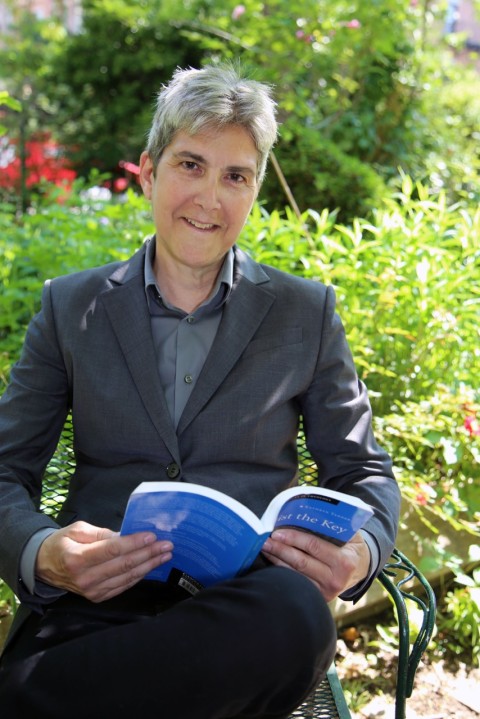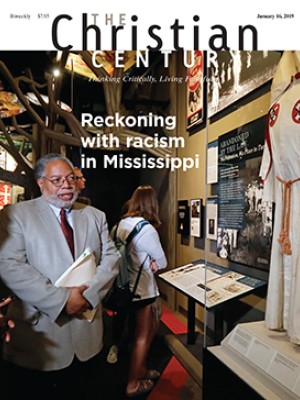Can Christianity be a counterforce to finance capitalism?
“Religious vocation sits very uneasily with individual self-advancement.”

Kathryn Tanner’s latest book, Christianity and the New Spirit of Capitalism, just published by Yale University Press and based on her 2016 Gifford Lectures at the University of Edinburgh, analyzes the ethos of modern finance capitalism and considers its theological implications. Tanner teaches at Yale Divinity School. Her other books include The Politics of God, Economy of Grace, and Christ the Key.
In Christianity and the New Spirit of Capitalism you argue that we live in an era of finance-dominated capitalism in which wealth is determined primarily not through the production of goods and services but by various schemes to maximize profit and minimize risk in the financial markets. This kind of capitalism, you suggest, has created a new personality type. How would you describe the person who has fully imbibed “the new spirit of capitalism”?
Read our latest issue or browse back issues.
Finance-dominated capitalism encourages people to think of themselves in the same way that profit-maximizing businesses think of them: their persons represent capital that must be put to maximally productive use. Simply put: each person must take individual responsibility for making the most out of his or her own life, in a life project that spans the whole of life, both at work and outside it. If one fails in such a project, one has no one but oneself to blame.
Finance-dominated capitalism also encourages a peculiar sort of time consciousness that prevents people from taking a critical distance on capitalism; they can’t imagine things ever being any different because of the way past, present, and future collapse into one another in finance-dominated capitalism. The present, for example, collapses into the past in which one assumed a debt or other obligation; that past rigidly constrains all future conduct. Or the urgency of present demands at work pushes out consideration of past and future; one hasn’t the time to consider anything more than the current emergency that stretches the entirety of one’s resources. Or the future, from which one hopes to profit in financial markets, becomes nothing more than the present expectations used to calculate it.
How does finance capitalism shape the life of the average worker who is still working on the assembly floor, or in the service industry, or in lower management—not in managing investments?
I am arguing that finance sets the terms for other sorts of business by forcing them to try to match the oversized profits possible in financial markets. This sort of disciplining by finance is especially direct when businesses are managed to maximize shareholder value, that is, with an eye to keeping their stock prices high. Nonfinancial businesses need to be as profitable as possible for such purposes, and this often comes at the expense of labor: employees are overworked, underpaid, and have few benefits, and therefore find themselves under enormous stress.
How has finance come to dominate capitalism? Don’t markets still depend ultimately on the efficient production of goods and services in fields like energy, medicine, communications, or retail?
Finance doesn’t push out those other markets; it just sets new standards of profitability. Those other markets therefore still do matter, especially when so many people remain dependent for their livelihood on them. The details of people’s work life in nonfinancial sectors is, for this reason, a primary focus of the book.
The sociologist Max Weber famously thought that there was an affinity between the Christian moral universe (or at least the Protestant moral universe) and the rise of early capitalism: Christians made good workers in the capitalist economy. You suggest there is a major tension between the Christian moral universe and the demands of finance capitalism. Can you give examples?
I don’t develop the tension in specifically moral terms—say, by way of a Christian opposition to greed or a Christian concern for the poor—but in terms of one’s fundamental self-understanding as that bears on relations to others. For example, how does one understand success or failure in one’s projects? As a matter for which one bears sole individual responsibility, over and against others in essentially competitive markets, as finance capitalism suggests? Are forms of religious achievement anything like that? I suggest not, because of the way God’s grace figures in both individual and communal life.
I am also interested in the temporal dimensions of Christian forms of self-understanding. Does one relate to the future, for example, as simply more of the same, as I argue finance capitalism encourages, or as holding out the prospect of radically unanticipatable novelty? In contrast to finance capitalism, I suggest one’s ultimate hope—for human life in which the life of God is fully manifest—is in unimaginable discontinuity with the life one leads now. The future in which one no longer struggles against sin but God is all in all is as radically different from the present as human is different from divine.
You say that Christianity has the capacity to offer a counterforce to finance capitalism. Can you name a few places where you see that counterforce at work in practice?
I am trying to show how Christianity can form resistant subjects, that is, how it can form people whose fundamental understanding of themselves, for specifically Christian reasons, does not line up with the demands capitalism makes on them. I argue that finance-dominated capitalism has as its linchpin, for profit maximizing purposes, an interest in the entire person, not just an interest in what people do at work or their spending habits. One can therefore hope that fundamentally different expectations of persons, on Christian grounds, can gum the system up, by helping to deprive the system of the willing subjects upon which it depends.
At odds with the way capitalism counsels people to relate to themselves and others, these resistant subjects might take any number of concrete actions to oppose the present system, from regulations to make financial transactions less lucrative, to agitation for a living wage and debt forgiveness. I am especially interested in the ways that churches, as depositories of pooled resources similar to banks, can supply capital for economic experimentation—for example, to help fund worker-owned and -managed businesses for purposes of community development.
Christians, like everyone else, may have their own imaginations formed or deformed by the new spirit of capitalism. How can Christians resist deformation?
I am trying to get people to take their Christian commitments as seriously as possible as guides for living; theologians, I believe, have the responsibility to encourage that and to model in their own work what it might mean to do so. Christians are inevitably formed by the culture around them, for good or for ill; but Christianity, like other forms of religious life, holds out the possibility of stepping back and seeing the way one has been formed by the wider culture in a critical light.
Early modern Christians had a sense of vocation in the world—they were called to live out their faith in everyday life, including in business and economics. Does your inquiry into the new spirit of capitalism point toward a new understanding of vocation or of the moral meaning of work?
I am trying to develop an antiwork ethic that extends a Protestant understanding of God’s free grace to everyday life. Devotion to God should be one’s life project—one’s vocation—in ways that encompass the whole of one’s life, including its economic dimensions; but I try to show how that religious vocation sits very uneasily with economic projects of individual self-advancement through work as currently configured in finance capitalism. Specifically, I try to undermine individual attributions of credit for success and blame for failure in highly competitive economic environments.
How did the phenomenon of finance capitalism come to be a focus of interest for you?
While I’ve been considering economic issues for some time, the financial crisis in 2008 was the catalyst for my thinking in this book. Because Christianity is to form a whole way of life, theologians need to address matters of contemporary significance; as that crisis made clear, an economy in which finance figures centrally is an urgent matter for present Christian consideration.
To help Christians navigate the world today in Christian terms, theologians need to develop not just an understanding of Christian commitments and how they are to be lived out; theologians also need to demystify the economy and unpack its workings. In the book, I try to do both in equal measure.
Is there anything good to be said about finance capitalism from a Christian point of view? Is there a Christian way to make money in the financial markets?
My research suggests that finance capitalism is especially problematic in fomenting economic inequality. Other forms of capitalism are compatible with profit making that is not a zero-sum game. Paying one’s workers more, for example, may allow them to buy the goods that the company produces, thereby increasing profit margins.
Financial products, to the contrary, can be enormously profitable in circumstances of widespread immiseration: the more people need loans, for example, the more one can charge for them, as the still highly lucrative sub-prime lending markets make clear. Moreover, participation in financial markets often amounts to simple betting against a counter-party; when one wins, someone else has to lose.
Given these essential features, I am not interested in finding Christian ways of participating in finance; I am interested in the extent to which Christianity can distance one from the economic system in which finance plays such a significant part.
If you had the chance to speak to pastors, what would you most want them to understand about the new spirit of capitalism? What would you want them to convey to their parishioners?
The spirit of Christianity and the spirit of capitalism are often blurred together; I’d like pastors to be able to distinguish the two and see the new spirit of capitalism on its own terms, as a self-sufficient motivator of conduct, to which Christianity can be opposed.
Weber argued that capitalism, at its start, needed the outside help of religion to find persons willing to abide by its unusual dictates; religious motives, of a specifically Protestant sort he argues, were therefore mixed with economic ones among such persons. Now that capitalism is up and running, and indeed has a near monopoly on ways of making a living, capitalism has the capacity to shape persons through its own culture; it provides it own reasons for acting, sufficient to direct conduct, independently of religious commitments. Recognizing the extent to which capitalism has its own culture will help Christian leaders see, I hope, the way that Protestantism and capitalism can be dissociated.
A version of this article appears in the print edition under the title “How finance capitalism deforms us.”






